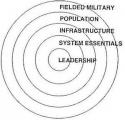We're aware of them and we're not doing anything about them (that means we're ignoring them) because a suspected/known State sponsor of terrorism says they're off limits. That brings up the question, are we fighting a war against terrorism and all their sponsors/supporters, or are trying to isolate an already isolated country and build a nation? Everyone agrees to some degree that is more than a simple homegrown insurgency that is restricted to the geographical boundries of Afghanistan. It is also a State proxy war, not just against us, but with the longer term strategic goal of achieving a perceived strategic advantage over India. It also involves numerous non-state actors coming to the Jihad like moths to a flame, just as they did during the Soviet occupation. There are a lot of stake holders in this conflict, this is not a simple internal insurgency like we saw in Malaya, and we won't win it in the villages alone.We haven't ignored the safe-havens. We've known about them since late 2001. Musharraf explicitly and publicly denied us the ability to do "hot pursuit" in early 2002. The problem isn't that we're ignoring the safe-havens - the problem is that we are unwilling to deal with the consequences of violating Pakistani sovereignty.









 Kissinger!!!you must be kidding his thinking from the 70's is the very bedrock of why we are in this mess.
Kissinger!!!you must be kidding his thinking from the 70's is the very bedrock of why we are in this mess.



Bookmarks